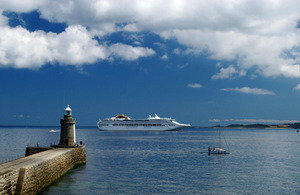New rights for maritime passengers
New EU regulation to give passengers travelling by water improved rights to assistance in cases of cancelled or delayed departures.

Ferry at sea
Passengers travelling by water are set to enjoy improved rights to assistance in cases of cancelled or delayed departures as a new EU regulation on maritime passenger rights enters into force today. These passengers will now benefit from similar rights to those travelling by air and rail.
The EU regulation, which will apply to most cruise and ferry services operating within the EU, also provides disabled persons or those with reduced mobility the same rights and accessibility assistance when travelling by water, as they have in other transport sectors.
Shipping Minister, Stephen Hammond, said:
It is important that passengers receive protection across all modes of transport, enabling them to travel with increased peace of mind throughout the EU. While no one enjoys disruption to their travel plans, I am pleased that this new EU regulation will provide passengers with the right to assistance in cases of cancelled or delayed departures. I am also pleased that this new regulation provides disabled persons or those with reduced mobility the same rights and accessibility assistance when travelling by water, as they have in other transport sectors.
Most journeys run smoothly. On the rare occasions when things do go wrong, it is important that passenger complaints are taken seriously and dealt with effectively at the appropriate level. So in this respect, I am extremely grateful to all the bodies that have agreed to undertake voluntary complaint handling roles. This demonstrates collaborative working between government and industry at its best.
For the purposes of implementation, the Passenger Shipping Association has agreed to act as the voluntary complaint handling body for England and Wales, with London TravelWatch retaining responsibility for services operated and licensed by Transport for London. The Consumer Council for Northern Ireland and the Scottish Government have also agreed to take up similar roles in their respective areas.
Bill Gibbons, Director of the Passenger Shipping Association, said:
We are pleased that the Shipping Minister and the Department for Transport have selected us as the voluntary complaints handling body for Maritime Passenger Rights in England and Wales. Over the past 2 years we have worked very closely with DfT officials together with our member cruise and ferry companies to achieve a successful implementation. We are confident that the industry as a whole will continue to offer customers an excellent service and will deal effectively with any complaints that arise through this new regulation.
Note to editors:
The government published its public consultation on UK’s implementation of the EU regulation on 5 October 2012. The 6 week consultation closed on 16 November 2012.
The EU regulation applies in respect of passengers travelling:
- on ferry services where the port of embarkation is situated in the territory of an EU member state
- on ferry services where the port of embarkation is situated outside the territory of an EU member state and the port of disembarkation is situated in the territory of an EU member state, provided that the service is operated by a union carrier. (‘union carrier’ means a carrier established within the territory of a member state or offering transport by a ferry service operated to or from the territory of a member state.)
- on a cruise where the port of embarkation is situated in the territory of an EU member state
The EU regulation includes a number of exemptions that are designed to exclude small boats and to protect small businesses. For example, it does not apply to ships certified to carry up to (and including) 12 passengers; on ships which have a crew responsible for the operation of the ship composed of not more than 3 persons; where the distance is less than 500 metres one way and on excursion and sightseeing tours other than cruises.
Under the new EU regulation, if an individual has a complaint, they should first raise it with the operator. If it cannot be resolved in this way, the complaint may then be referred to the appropriate complaint handling body. It is expected most complaints will be resolved at one of these 2 stages. However if this is not possible, the complaint may then be investigated by the national enforcement body, who will consider whether there has been a breach of the EU regulation. The Maritime and Coastguard Agency (MCA) will operate as the national enforcement body for the whole of the UK.
Press enquiries: 020 7944 3108
Out of hours: 020 7944 4292
Public enquiries: 0300 330 3000